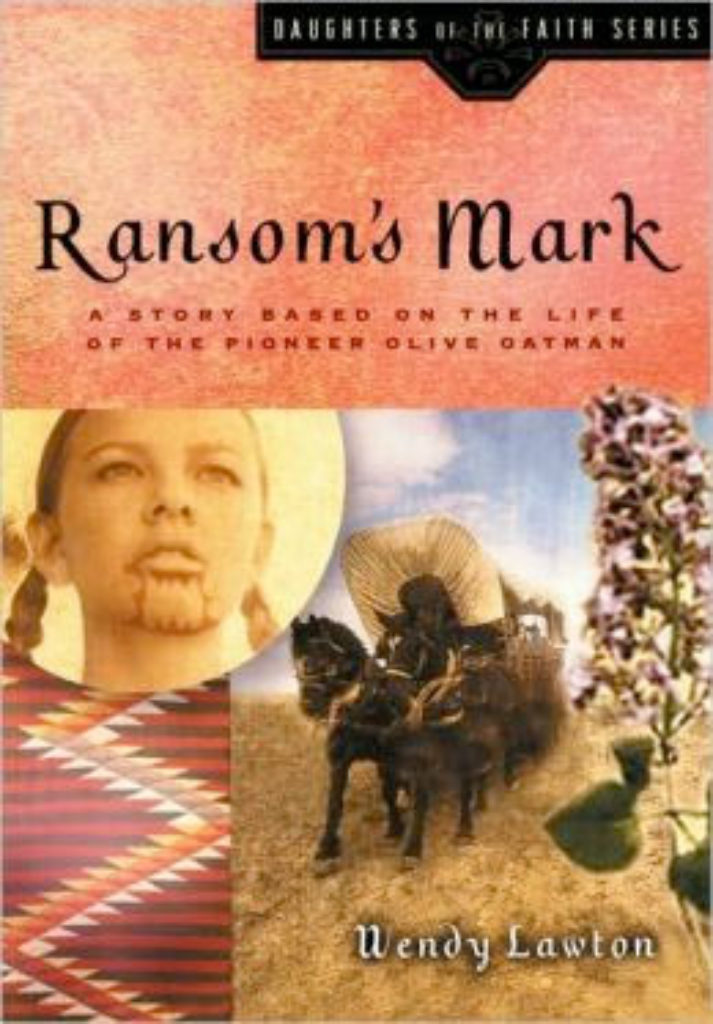Ransom’s Mark by Wendy Lawton has been reviewed by Focus on the Family’s marriage and parenting magazine. It is in the “Daughters of Faith” series.

Ransom’s Mark by Wendy Lawton has been reviewed by Focus on the Family’s marriage and parenting magazine. It is in the “Daughters of Faith” series.
When Olive Oatman and her large family head West with a large party of pioneers, she longs for peace and security. But when her family splits from the group, a renegade band of Yavapai Indians massacre them, taking the surviving Olive and her younger sister, Mary Ann, with them. Treated cruelly, the sisters cling to each other and the faith taught to them by their parents. They are surprised to find their prayers answered in the unexpected figure of Topeka, a Mohave chief’s daughter, who pays a ransom for them. She takes them to her people. Over time, Olive and Mary Ann regard the Mojave as family and suffer through drought and famine with them. Olive even wears the facial tattoo of the Mojave, a permanent reminder of her ransom and rescue. Failing health and malnutrition finally claim Mary Ann, and Olive’s faith falters under the weight of the “Why?” she repeatedly asks God. To her surprise, Olive learns that one of her brothers not only survived the massacre but has been searching for her. The Mojave release her to her people, despite the fact that she feels like a young woman caught between two cultures. She learns that ultimately she belongs to the God who never abandoned her and paid her ransom on the Cross.
The author draws parallels to Christianity in the following ways:
The Oatmans’ faith is present on nearly every page. Olive’s mother is a nurturing mother and a submissive wife who values her Bible most among her possessions. Olive’s father is troubled by the strange religious teachings and use of divination by the group’s leader, which prompts him to separate his family from the leader. When Olive is discouraged, her mother reminds her that God is always with them, even when things are tough. Psalm 18 becomes important to Olive throughout her trials in the story. In the hours after her family is massacred, Olive has a strong sense that God is still with them and weeps at the evil that has been done.
After the massacre, Olive and Mary Ann encourage each other by remembering Scripture and God’s faithfulness. They adhere to the family tradition of praying before work every morning. Together and individually, the sisters pray for someone, somehow, to rescue them from their captivity. When the Mojave, Topeka, ransom them, they learn that God put the desire in Topeka’s heart to rescue the girls. Olive learns that God’s answers to prayers do not always come in the form she expects.
As the Oatman sisters work their small field given to them by the Mojave, they pray over every shoot to prosper. Mary Ann senses the coming of her own death but tells Olive not to worry because she [Mary Ann] will be in heaven with the rest of the family. When Olive struggles with her own faith, she knows enough to pray for more of it. Her Mojave friend helps her learn to tap into her own faith by remembering God’s provision and protection in her life. When Olive has a chance, she shares with her Mojave family about Jesus.
Lawton establishes the Christian themes of substitution and ransom early and often. Early on when Olive’s brothers play Indians, Olive gives herself to be their captive in place of her younger sister. Olive explains clearly to her sister that Christ provided the original example of substituting one more valuable for the one in need of rescue. Olive also tells Mary Ann the story of Beauty and the Beast, emphasizing Beauty’s willingness to take her father’s place in the castle of the Beast. As a captive herself, Olive learns about being ransomed and being claimed. She understands that the tattoo she wears on her face forever marks her as a Mojave, just as her faith in Christ forever marks her person as His.
Little is explained about the Mojave beliefs, although they are called pagans, and Olive understands that they do not believe in God the same way she does. When members of the tribe die, they are wrapped and burned, although the chief allows Olive to bury her sister in the ground.
Note: If parents pursue additional study, they will learn that the Oatmans were a Mormon family.
Mr. and Mrs. Oatman are fair in their parenting, and the children demonstrate love and respect for them. Mr. Brewster, the leader of the wagon train, tries to convince the others that he is a prophet, but many of the men he is leading question his authority and reliability. When Olive and Mary Ann live with the Yavapai, the authority over them is wielded with cruelty, but the Mojave leaders (tribal and family) are welcoming, encouraging and even sacrificial.
No profanity. Lawton handles the horror of the massacre appropriately for this age group. The confusion and fear Olive feels is described more than the scene itself. One of her brothers is briefly described being clubbed; one of her sisters is struck and falls on her; and after the massacre, Olive sees the bodies on the ground.
None
Get free discussion questions for this book and others, at FocusOnTheFamily.com/discuss-books.
If parents pursue additional study, they will learn that the Oatmans were a Mormon family.
You can request a review of a title you can’t find at [email protected].
Book reviews cover the content, themes and worldviews of fiction books, not their literary merit, and equip parents to decide whether a book is appropriate for their children. The inclusion of a book’s review does not constitute an endorsement by Focus on the Family.